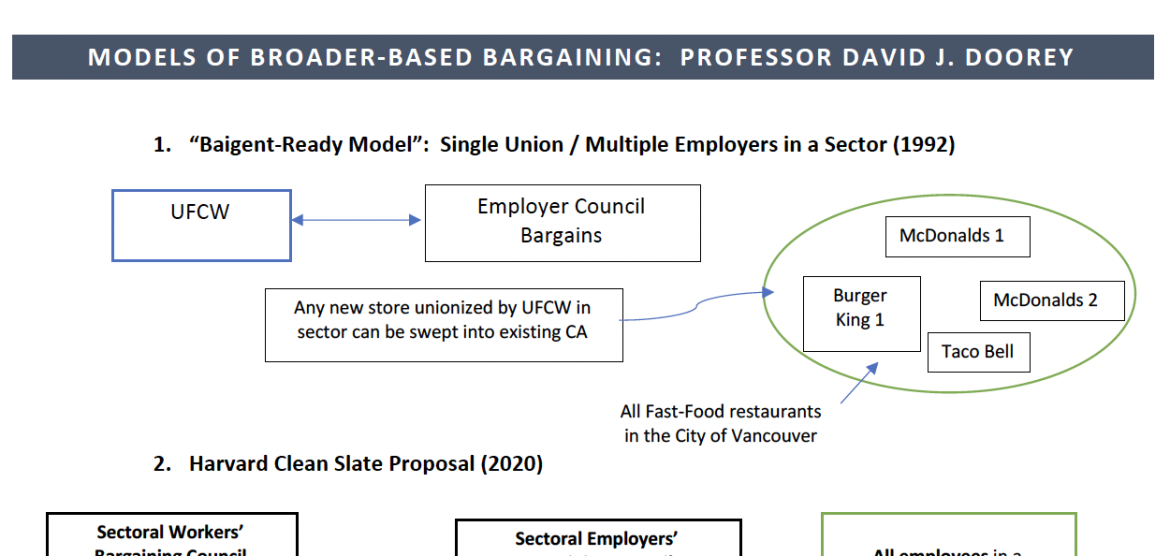Written by David J. Doorey
Among the hottest topics at any labor law gathering in recent years, along with how best to regulate ‘gig’ workers of course, is broader-based bargaining or sectoral bargaining. These terms refer to collective bargaining models that situate negotiations at a level higher than the individual workplace or ‘enterprise’.
For example, under the existing labour law model dominant in Canada and the United States (often described as the “Wagner model”), the presumption is that collective bargaining takes place at the workplace level. If employees of a single McDonalds store join a union, then that union would normally try to bargain a collective agreement that covers only the employees at that one store. This model works pretty well when the workplace is a steel mill or car factory that employs hundreds or thousands of workers. However, it does not work well when the workplace is a single store of a company like McDonalds, which has hundreds of restaurants in Canada, sometimes operating as franchises and sometimes owned by ‘corporate’ McDonalds. It doesn’t work well because a handful of employees at a single store have virtually no bargaining power against a giant multinational corporation like McDonalds that is intent on remaining non-union.
Not surprisingly, therefore, the service/retail sectors have among the lowest levels of collective bargaining coverage. These sectors also tend to employ many of the least well off workers in our society, including high percentages of women and racialized workers. As a result, there has for a very long time been discussions about moving collective bargaining ‘upwards’ to a sectoral or at least ‘corporate’ level rather than a workplace level. We have examples of this in Canada, especially in the construction sector where some bargaining takes places by trades at a provincial level (all carpenters employed in Ontario). You can learn about the construction model here if you’re interested.
There are a number of challenges to implementing broader-based, sectoral bargaining in Canada’s service sectors (and other sectors without a history of this structure). One is that employers don’t want it and will put up huge resistance in all likelihood. Broader-based bargaining was introduced in Canada’s construction industry in some provinces because EMPLOYERS wanted it. However, the McDonalds and Starbucks of the world aren’t lobbying for a new model that will help workers access collective bargaining. Another challenge is that virtually no one agrees on what a model of sectoral bargaining should look like even if a government were inclined to consider introducing one. These challenges, among others, recently led the experts on the Ontario Changing Workplaces Review to consider and then (mostly) reject calls for a new dramatic model of sectoral bargaining.
Nevertheless, some models do (or did) exist in Canada and elsewhere and other models have been floated but never adopted. I have explained some of the proposed models before, including a model proposed in 1992 in British Columbia (the “Baigent-Ready Proposal”) and New Zealand’s new law providing a form of sectoral bargaining. I’ve also described one of my favourite laws that was in effect briefly in Ontario and that is not ‘sectoral bargaining’, but that provides a roadmap for organizing unions to build towards broader-based bargaining one location at a time (“A Canadian Proposal for Starbucks Bargaining”).
For my own benefit, I recently prepared a couple of charts that provide a quick overview of various models of sectoral bargaining that have been considered as potential models for Canada. For those interested in the subject, I’m attaching the two documents here:
Spreadsheet describing models of broader-based bargaining.
One-Page Chart summarizing who bargains with whom and how the model works.
The documents describe the following models:
- The “Baigent-Ready Model” proposed in British Columbia in 1992 (which you can read here)
- The new New Zealand model for sectoral bargaining.
- The model of sectoral bargaining proposed in Harvard Law School’s Clean Slate for Worker Power report (I was the Canadian representative on the Clean Slate International Committee).
- A model of broader-based bargaining for franchises proposed by Ontario’s Changing Workplaces Review.
- A model that has been proposed on a number of occasions and that was law in various forms in 1993 and then again briefly in 2018 in Ontario, which permits the labour board to consolidate multiple unionized workplaces of the same employer and then permits unions to sweep into that unit any newly unionized locations of the same employer.
As always, your thoughts welcome on whether you believe any of these models are worth pursuing in Canada. Would they work to the benefit of employees? Are there other models that you prefer?

